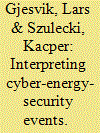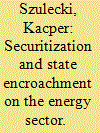| Srl | Item |
| 1 |
ID:
190061


|
|
|
|
|
| Summary/Abstract |
The digitalisation of the energy system brings out the question of cyber threats. How this area is perceived and how cyber-security policy in the energy sector develops is driven by the most spectacular cyber-incidents. How do these events shape public perceptions about the dangers of digitalisation? To understand this, we look at the 2016 CrashOverride cyberattack on Ukraine’s grid. Hypothesising that cyber-energy security incidents are interpreted in the context of socio-technical imaginaries of the energy sector and security imaginaries linked to foreign policy, we distil four discourses that emerged around the Ukraine attack among Western experts and commentators. One represented it as evidence of an accelerating race towards disaster, another as merely a tip of the iceberg. The third portrayed it as less catastrophic than initially suggested, while the last one as part of Russia’s cyber strategy. Not all of these were picked up by the broader public debate in Western security circles, and only the more alarmist discourses had a visible impact beyond niche communities.
|
|
|
|
|
|
|
|
|
|
|
|
|
|
|
|
| 2 |
ID:
169865


|
|
|
|
|
| Summary/Abstract |
As energy security becomes a key topic of policy debates, not least in Central and Eastern European states, which are vulnerable to gas supply disruptions from Russia, it has been suggested that EU energy policy becomes ‘securitized’. However, full securitization attempts, which not only identify threats but also call for exceptional measures to deal with them, are relatively rare in the energy sector. Why do governmental actors initiate securitizing moves aimed at implementing exceptional measures in the energy sector, and what explains the acceptance of certain moves or measures and dismissal of others? This paper looks at Poland, comparing two examples of such moves. Drawing on a primary document analysis, the paper shows how a shared socio-technical imaginary provided an anchor for the successful securitization of the nuclear project, while liberal market discourses limited audience acceptance of the securitizing move in the power sector. Securitization appears to be a mechanism triggered when core state powers over energy are challenged from below (civil society, market actors) and above (supranational institutions), particularly in already securitized contexts. The paper concludes with the value added of Securitization Theory for energy policy studies and lays out a Critical Energy Security Studies agenda, which can build on it.
|
|
|
|
|
|
|
|
|
|
|
|
|
|
|
|